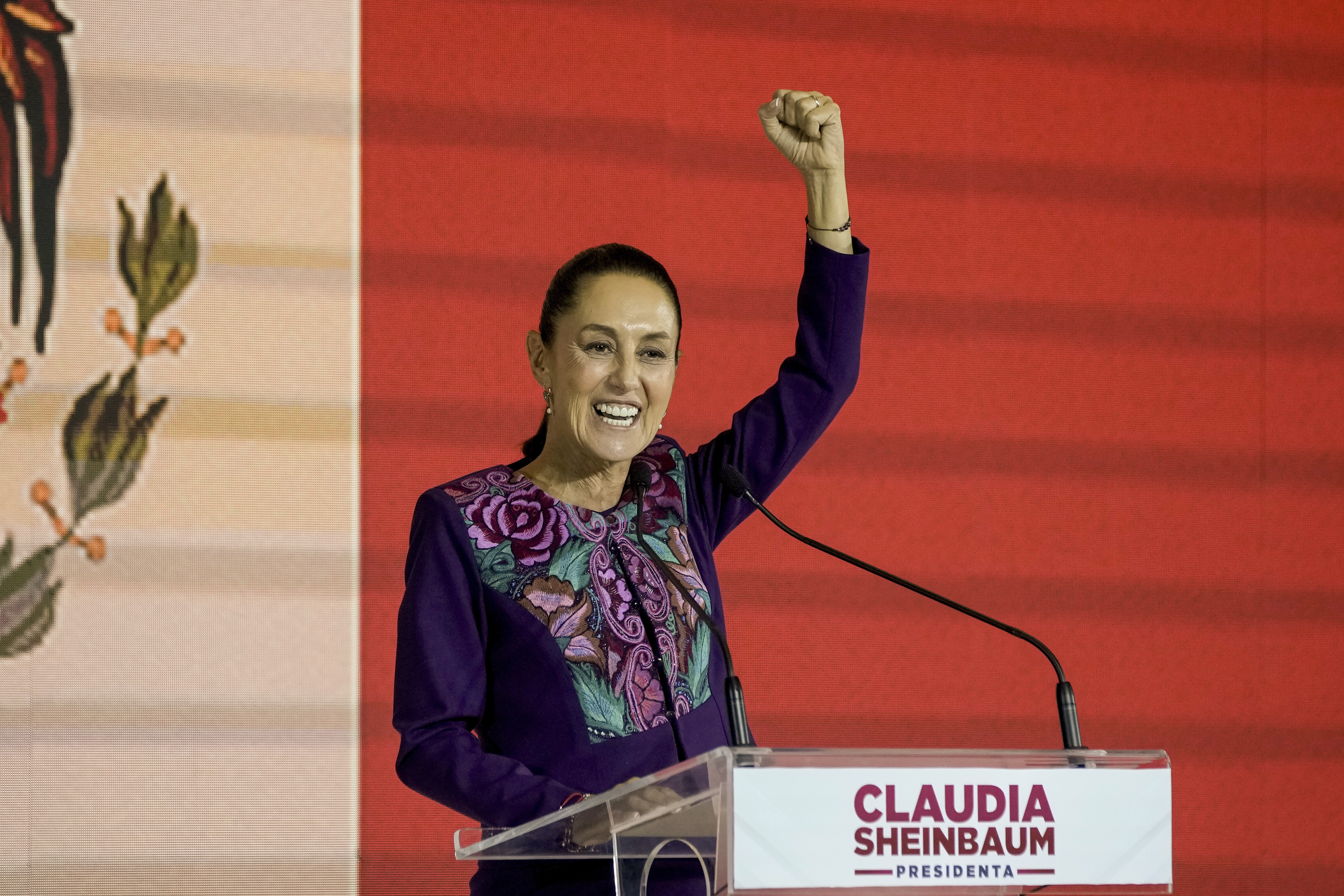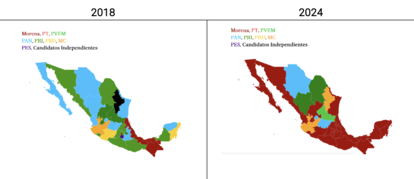Election in Mexico
Mexico elects its first female president and gives her extreme power

Mexiko wählt seine erste Präsidentin und gibt ihr extrem viel Macht
© picture alliance / ASSOCIATED PRESS | Eduardo VerdugoLast Sunday, June 2, over 20,000 public offices were elected in Mexico making it the largest election in history. Claudia Sheinbaum, former Mexico City mayor and climate scientist won the presidential election by more than thirty points, making be the first woman Jewish president. While this is a milestone in a “machista” country. The ruling party's equally overwhelming election victory in Congress represents more of a risk for Mexican democracy, as it gives the government the power to make far-reaching constitutional changes.
During the 2024 elections, the National Electoral Institute reported an average participation of 60%, lower than in previous elections. Nevertheless, preliminary results show the unstoppable advance of the left ruling party Morena, founded by current president Andrés Manuel López Obrador (AMLO). The party began governing in 2018 four of the 32 states. In 2024, from the nine states holding elections, Morena won seven of them, allowing them to control almost the whole territory.
After the electoral results, the Mexican peso depreciated against the US dollar by almost 2%. Although Sheinbaum's victory had been widely anticipated by the markets, the possible supermajority of the Morena coalition in Congress took investors by surprise. AMLO's attacks against independent institutions have strongly focused on the Supreme Court aiming to promote that ministers are elected by popular vote in order to decrease its power and independency. Civil society organisations have warned that this could fade the division of powers.
Weak Institutions and an ever more Fragile Democracy
A majority in Congress would allow Morena to pass over 20 reforms that were previously blocked by the Supreme Court of Justice, which has served for the past 6 years as the most effective counterweight. In June 2023, the Court ruled as unconstitutional the presidential decree aimed at eliminating the Energy Regulating Commission, which fosters competition level playing field between Pemex (National Oil Company) and private market players. The Court also declared unconstitutional an attempt to change Mexico’s electoral laws, which imposed an 86% reduction on the budget of the National Electoral Institute. More recently, it is focusing on protecting autonomous institutions such as the National Institute of Transparency and Access to Information and Data Protection from disappearing. The new Congress starts sessions on September 1, giving AMLO one month to pass the reforms even before he leaves office in October.
In May 2024, Claudia Sheinbaum established that the judicial power should focus on supporting the laws approved by Congress. Thus, the Supreme Court should respond “to the nation”. She never mentioned autonomy or independence, and did not consider that the division of powers is a positive aspect for democratic quality. Actually, Sheinbaum stressed that the only division of powers is the division between political and economic power that began with AMLO. The Economist and Latinobarómetro reflect how Mexico has become a more hybrid than a democratic regime. The erosion of democracy will probably continue; since the first section of Sheinbaum´s government plan states to follow AMLO´s plan and suggested reforms.
Economic Uncertainty: A potential fiscal crisis and Hope for Energy Transition
Russia’s invasion of Ukraine and the United States economic tensions with China boosted reinvestment in Mexico. In a world of geopolitical blocs, markets suggest that Mexico is stable with a currency appreciating 15% against the U.S dollar in 2023, and good performance on credit default swaps. This scenario is taking now a different form with markets shaking amid the new composition of Congress.
Moreover, in 2018 AMLO inherited a good fiscal panorama from ex-President Enrique Peña Nieto with a fiscal deficit equivalent to 2% of the GDP. In contrast, he will deliver a fiscal gap of 6% of the GDP to Sheinbaum. In 2024, the general debt percentage of GDP will end up above 50%, a concerning level for a country collecting 17% of its GDP in taxes. Thus, this year, Mexico will run its biggest budget deficit in the last 24 years. One of the best examples is the case of Pemex where the production of oil continues to fall losing up to 53 million USD in the past five years and demanding 94 million USD from federal government to stay afloat. This situation is concerning since Sheinbaum promised to keep the spending and social programs and she will most likely avoid a politically dangerous fiscal reform, hoping that more stringent tax collection policies will be enough to finance her government. In order for this plan to work, companies will probably face more taxes and these are not good news for investors.
Mexico also pledged a 35% reduction of its emissions by 2030 under the Paris Accord commitment. It is the 12th largest crude oil exporter, 14th greenhouse gas emitter and it is among the top 10-methane emitter. The country needs to achieve its goals by speeding the energy transition opportunities. The decarbonization of the oil and energy state companies, Pemex and CFE, needs to be a priority to not only meet climate change goals under the 2030 Agenda, and boost investments, but to reduce the probability of a fiscal crisis.
If Sheinbaum continues with AMLO´s energy policies aiming for energy sovereignty and no private sector participation, the country will surely face an energy supply crisis soon. The country has faced record high temperatures leading to a higher demand for electricity. However, the government began to limit electricity generation permits to private companies, leading to less investment and a decrease in installed capacity. Sheinbaum promised a transition towards clean energies while continuing to favor the two national energy companies as part of the strategy of strengthening the role of the state in energy matters. The panorama looks unpredictable.
The first female President, but an eroded Division of Powers
Claudia Sheinbaum faces many more severe challenges such as a 94% impunity level, a rise in organized crime activities, bottlenecks in infrastructure, setbacks in education, health, and a low annual economic growth of 2%. Citizens, civil society organizations, academia, journalists and companies, all agree that security is the most pressing issue. AMLO´s six-year term will end up with almost 200,000 homicides; double than the total of Felipe Calderón´s administration (2006-2012) and 30% more than Enrique Peña Nieto administration (2012-2018).[1] Some parts of the country are captured by criminal organizations damaging economic activities and small communities. Mexico only spends 1% of its GDP on security and a criminal landscape diminishes its growth potential, increasing indirect costs for companies that invest in the country. Additionally, every 12 years electoral cycles in Mexico and the U.S coincide. Sheinbaum will need to negotiate with the next president of the U.S on security and migration issues to collaborate more deeply.
Claudia Sheinbaum has positioned herself as a loyal follower of President AMLO to achieve the candidacy of the ruling party and win the election. With a majority in Congress and her party Morena ruling in almost all the territory it will be easy to pass reforms. Mexico celebrates having her first woman president. Nevertheless, she will need to prove if she can also promote human rights for all. The results are not good news for democracy: opposition is less represented, the division of powers between executive, legislative and judicial branches will be eroded, and most probably autonomous institutions will disappear. Mexican democracy is young: in the 200 years since its independence, the country has only witnessed a true democracy since the year 2000. The future of checks and balances will be at stake with the upcoming reforms once the new Congress takes office in September. In terms of democratic quality, the future does not look promising. Time will tell if the first woman president in Mexico will step out of her predecessor shadow once he leaves office. It remains to be seen what she will do with this historic opportunity.

